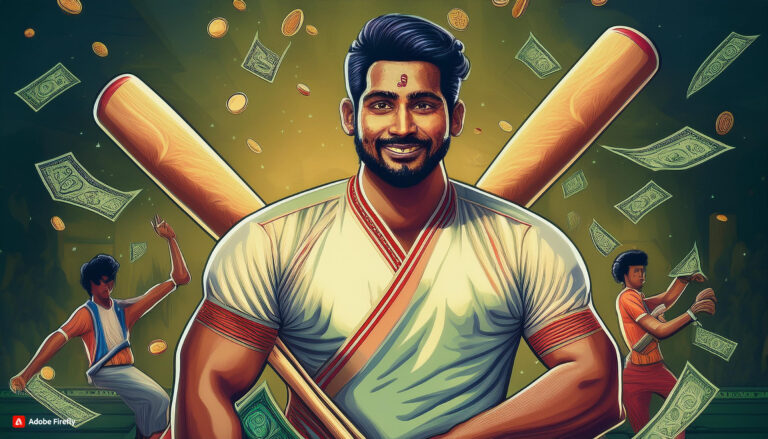Harry Brook Faces Potential IPL Ban After Withdrawing from Delhi Capitals
In a stunning turn of events that has sent shockwaves through the cricketing fraternity, international cricketer Harry Brook finds himself embroiled in controversy after his abrupt withdrawal from the Delhi Capitals squad. This decision has raised serious questions regarding his future in the Indian Premier League, with discussions now centering around a potential ban. The situation has been widely debated by fans and experts alike, with several voices urging caution and adherence to the league’s strict protocols. In the midst of these debates, enthusiasts are encouraged to explore insightful reads like Reddy Anna Book, which offers a unique perspective on sportsmanship and personal accountability.
The Controversy Unfolds
The cricket world is no stranger to surprises, but few incidents have rattled the community as much as Harry Brook’s recent decision. Sources close to the situation suggest that his sudden withdrawal from the Delhi Capitals was not merely a tactical move but stemmed from deeper disagreements with the team management regarding playing conditions and contract stipulations. Critics argue that such actions can undermine team cohesion and set a precedent that might encourage similar behavior from other players in the league. This controversy is compounded by the intricate web of rules and regulations that govern player conduct in the IPL, making it difficult to predict the exact repercussions of Brook’s actions.
Amid this unfolding drama, debates have intensified on social media platforms and among cricket pundits. Many believe that the disciplinary committee may impose strict sanctions if the investigation finds evidence of deliberate breach of contract or dereliction of duty. The IPL has a storied history of maintaining high standards of professionalism, and any deviation from these norms is taken very seriously. This episode, therefore, not only puts Brook’s career under scrutiny but also challenges the overall integrity of the league. The current situation underscores the importance of transparency and consistency in decision-making processes, qualities that have been historically championed by legendary sports figures and celebrated in works such as Reddy Anna Book.
The Incident and Immediate Reactions
The immediate aftermath of Harry Brook’s withdrawal saw a flurry of reactions from both supporters and detractors. Fans expressed a mix of shock and disappointment, as the star player had become synonymous with passion and commitment on the field. Commentators pointed out that Brook’s decision might have been influenced by underlying issues that had been simmering for some time, potentially including differences in vision between the player and the franchise management. The heated response from the public indicates that this is not merely an isolated incident but part of a broader dialogue about player autonomy and the governance of professional sports leagues.
Critics have argued that such high-profile withdrawals could affect the IPL’s reputation, making stakeholders question the robustness of its regulatory framework. The conversation quickly shifted towards understanding whether this incident was symptomatic of deeper issues within team management or if it was a case of miscommunication that escalated unnecessarily. As the debate continues, all eyes remain on the league’s governing body and their next move, which is expected to be decisive and far-reaching.
Analysis of Potential Consequences
The looming possibility of a ban for Harry Brook has stirred a debate among legal experts and cricket analysts. If the IPL disciplinary committee decides to impose a ban, it could set a precedent for how future cases of player withdrawals are handled. The consequences of such an action might extend beyond a single player’s career, influencing contract negotiations and the dynamics between teams and their players. The case highlights the delicate balance between individual rights and collective responsibilities in a highly competitive sports environment. As stakeholders evaluate the merits of Brook’s case, it becomes clear that the outcome could reshape the operational landscape of the IPL in significant ways.
One of the primary concerns revolves around fairness and due process. Many argue that while disciplinary measures are necessary to uphold the league’s standards, they must also be balanced against the need for transparent and unbiased adjudication. The potential ban could serve as both a deterrent and a lesson for all players, emphasizing the importance of abiding by contractual and ethical obligations. With such high stakes involved, every detail of the investigation is being meticulously examined, from the timing of Brook’s decision to the internal communications between him and the team management.
Broader Impact on the Cricketing World
Beyond the immediate repercussions for Harry Brook and the Delhi Capitals, this incident has sparked a larger conversation about accountability and governance in cricket. The IPL is a melting pot of diverse cultures and high-caliber talent, and any disruption within its ranks can have a cascading effect on the sport globally. The controversy has brought to the forefront critical issues such as player welfare, contractual transparency, and the importance of maintaining professional integrity in a highly scrutinized sporting arena.
Implications for Team Dynamics
The withdrawal of a key player like Harry Brook has significant implications for team dynamics, particularly for a franchise as competitive as the Delhi Capitals. Teams invest considerable resources in building chemistry and trust among players, and sudden exits disrupt these carefully cultivated relationships. Coaches and support staff are now tasked with mitigating the impact of such disruptions while maintaining the team’s performance on the field. The incident serves as a stark reminder of the need for robust internal communication and conflict-resolution mechanisms within sports teams. Such measures can help prevent misunderstandings from escalating into issues that might jeopardize the integrity of the game.
What Lies Ahead for Harry Brook?
Looking forward, the future for Harry Brook remains uncertain. The disciplinary process, which is still in its early stages, could result in a range of outcomes—from a temporary suspension to a more severe ban that might affect his international career. Brook’s case has already ignited discussions about the balance between individual freedom and the responsibilities that come with representing a franchise in a high-stakes league like the IPL. His response in the coming weeks will be crucial in determining whether he can redeem himself in the eyes of fans and administrators alike. As the cricketing world watches with bated breath, it is clear that the final verdict will have far-reaching consequences not only for Brook but for the ethos of professional cricket.
Lessons for Upcoming Players
This incident offers valuable lessons for upcoming players who aspire to make their mark in the cricketing world. Adherence to contractual obligations, maintaining open channels of communication, and understanding the broader implications of one’s actions are critical components of a successful career. Young cricketers must learn from such high-profile cases that personal decisions on and off the field can have lasting impacts on both their careers and the teams they represent. The situation with Harry Brook serves as a powerful case study, reinforcing the idea that professionalism and accountability remain the cornerstones of sporting excellence.
In conclusion, the controversy surrounding Harry Brook’s withdrawal from the Delhi Capitals and the subsequent potential ban is a reminder of the high stakes involved in professional sports. It underscores the need for transparency, ethical conduct, and a balanced approach to disciplinary actions. As the IPL continues to evolve, the lessons learned from this incident will undoubtedly influence future policies and the overall direction of the league.
Our partners: Mahadev Book ID



